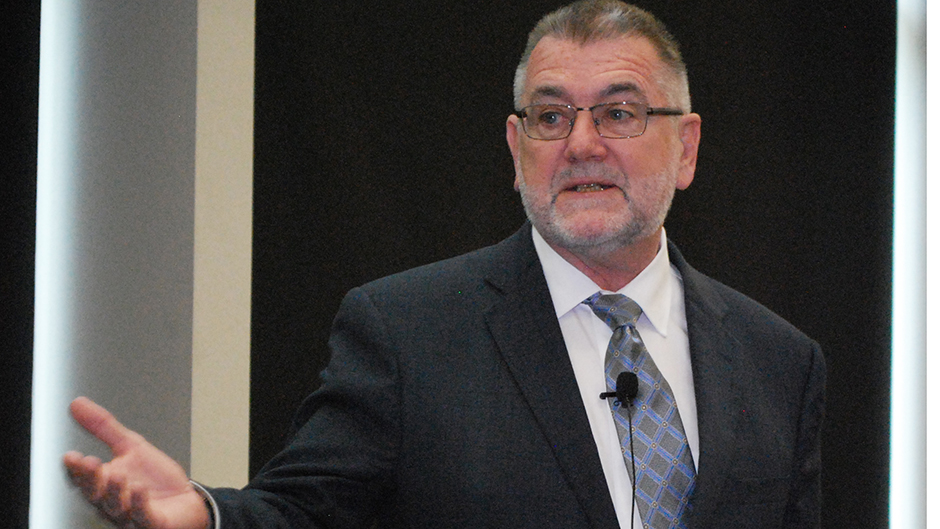Why did Nazi Germany systematically murder six million Jews? Why did no one try to stop them? Peter Hayes, Professor of Holocaust Studies Emeritus at Northwestern University and author of “Why? Explaining the Holocaust,” provided answers to those questions at the 18th Holocaust Studies Summer Institute, held June 11-14 at the University of Miami’s Robert and Judi Prokop Newman Alumni Center.
Adolph Hitler delivered a powerful message to a German nation reeling from inflation and humiliated by its defeat in World War I, Hayes told 75 Miami-Dade County teachers attending the annual professional development program. Blaming “the Jew” for Germany’s desperate situation, Hayes recounted that Hitler told his supporters: “Only I can fix this. Only I have the will.”
“Beware the beginnings of fascism,” Hayes said. “Hitler benefited from a lack of moral courage from Germany’s corporate elite, and the cynicism of its older political leaders who felt he could be manipulated.”
By taking away the civil rights of Jews and using his Stormtroopers for intimidation in the 1930s, Hitler took Germany down the dark path that led to the Auschwitz concentration camp, Hayes said. “The Nazis killed 75 to 80 percent of the Jews they could reach. It was a cataclysm of violence that very early achieved its objective of killing all European Jews,” a plan the Nazis called the “Final Solution.”
Miriam Klein Kassenoff, a child of the Holocaust and founding director of the University of Miami Holocaust Teacher Institute Team, led the annual professional development institute, sponsored by UM’s School of Education and Human Development and the Miami-Dade County Public Schools Division of Academics, Department of Social Sciences. Other supporting UM institutions included the School of Law, Miami Business School, The Sue and Leonard Miller Center for Contemporary Judaic Studies and the George Feldenkreis Program in Judaic Studies.
“Educating our students about the Holocaust has never been more important than it is today,” said Kassenoff, who told attendees the dramatic story of her escape from Nazi-occupied Czechoslovakia in June 1941 with her family. “Our institute provides practical information for teachers, along with opportunities to learn from notable speakers.” Noting that UM hosts the most-attended Holocaust Teacher Institute in Florida, Kassenoff said, “It is my goal to make this the most desired learning place in the country for educators so everyone knows the University of Miami is the Holocaust Learning Center for Teacher Training.”
Institute presenters included Michael Berenbaum, founding project director of the United States Holocaust Memorial Museum, who spoke on “The Holocaust and Other Genocides” and discussed “America and The Holocaust” during a panel discussion with Hayes. As the scholar-in-residence of the Holocaust Teacher Institute, Berenbaum has contributed his time and expertise for the past 17 years.
“We are most fortunate to have his presence and expertise at all of our institutes,” said Kassenoff, noting that Berenbaum is also the author of “The World Must Know” and conceptual designer of Holocaust memorials throughout the world.
Other institute presenters included Kori Street, senior director of programs at the University of Southern California SHOAH Foundation; Mary Johnson, senior historian at Facing History and Ourselves; Reva Ginsburg, Yiddish scholar and professor, Robert Watson, author and scholar; Igor Shteyrenberg, director of the Miami Jewish Film Festival; and Ruth Gold, author and Holocaust survivor.
“I was very moved by Ruth Gold’s testimony about her family in a Romanian concentration camp,” said Efrem Figueredo, a languages teacher at Country Club Middle School in Hialeah. “As teachers, we need to hear the voices of Holocaust survivors.”
A veteran of 10 summer institutes, Sharlene Goldberger, a teacher at Arvida Middle School in Miami, said, “Each of these workshops is better than the one before. I learn new things and enjoy the stimulating conversations with other teachers.” She also pointed to the continued importance of Holocaust education, citing a recent name-calling incident where one student thought Auschwitz was a boarding school—not a death camp.
Before giving his keynote talk on June 13, Hayes advised Miami-Dade teachers to ask their students what they want to learn about the Holocaust. “If you focus on those questions, you can help them understand the most important lessons of the Holocaust,” he said.
Hayes said he organized his book in eight chapters, each based on a question posted by his students at Northwestern University. Asked why the Nazis singled out the Jews for killing, he noted that hostility against Jews dates back to ancient Rome, when its emperors embraced Christianity. “There were restrictions in many areas to keep Jews confined and away from Christians to avoid contaminating the faith,” he said.
However, the situation for many European Jews changed for the better in the early 1800s following the French Revolution. “In France, Jews could finally immigrate into a society they had lived alongside for many generations,” he said. “Now, they could go to universities, become professionals and exercise their talents.”
But in the late 1800s, a countermovement with the new name of “anti-Semitism” began, led by right-wing agitators who opposed the leftist creed of Marxism. But anti-Semitic parties never gained more than a small percentage of the votes in European parliaments until Hitler came to power in 1933 and turned Germany into a murderous society.
As to why no one was able to stop the Holocaust, Hayes said three-quarters of the deaths occurred while German armies were on the advance. “Not until June 1944 did aircraft from allies based in Italy have the ability to bomb Auschwitz,” he said. “However, factories and military bases were targeted, instead, because winning the war came first.”
Hayes added that the Jews in Germany, as well as other Central European countries, were deeply divided by how to respond to Hitler. “Some were advocates of resistance, while others opted to do everything the Germans required,” he said. “In the end it didn’t matter. They all ended up the same way—dead.”

